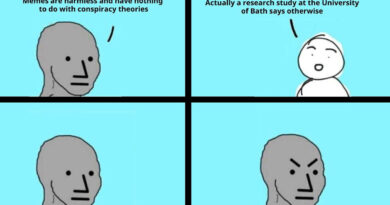Who believes in conspiracy theories and why? Listen to part two of our expert guide
Polls show that most people believe in at least one conspiracy theory. Considering the number of conspiracy theories there are, perhaps this isn’t surprising. But research shows that people who believe in one conspiracy theory are more likely to believe in others.
Part two of the Expert guide to conspiracy theories, a series from The Conversation’s Anthill podcast, discovers who these people are. We find out what psychological factors influence whether you believe in conspiracy theories or not. And how things like the time and place in which you live, who your friends are and who holds political power makes you more open to certain conspiracy theories.
Jan-Willem van Prooijen, associate professor of psychology at Vrije Universiteit Amsterdam in the Netherlands, explains his theory that humans are hardwired to believe in conspiracy theories. He says the circumstances of hunter gatherer life meant that our ancestors adapted to be overly suspicious:
We think that there is an evolved basis for the human tendency to easily distrust other groups, which I think is at the heart of conspiracy thinking.
Times have changed but humans are stuck with this hangover from hunter gatherer times that we sometimes struggle to shake. We speak to psychologists Karen Douglas and Aleksandra Cichocka at the University of Kent in the UK to find out why certain people today are more likely to believe in conspiracy theories than others.
We find out how political beliefs influence whether or not people believe in conspiracy theories. Joseph Uscinski, a political scientist at the University of Miami in the US, talks us through his theory that people who vote for the losing side in an election are more likely to believe in conspiracy theories than those on the winning side. Uscinski studied every US election since 1890:
We looked over time to see who was accusing who of conspiring. And what we saw was that as the presidency shifted back and forth between Republican and Democrat, the conspiracy theorists did too. So whoever was in the White House, their side received the brunt of the accusations.
For a slightly different perspective on who believes in conspiracy theories, we talk to anthropologist Annika Rabo from Stockholm University in Sweden. She did fieldwork for many years in Syria and tells us how talk about conspiracies permeates society – it’s unavoidable. There are all sorts of conspiracy theories and they relate to the US, to Israel but also their own government.
Jovan Byford, a social psychologist at the Open University, explains why it’s important to understand the historical context in which certain conspiracy theories emerge and flourish. He points out that the status conspiracy theories are given in society influences how popular they are. And why we need to recognise that not everyone engages with them in the same way:
Some do it in a fun way. Some don’t take it particularly seriously. Others consider them to be an explanation to which they don’t subscribe, but nevertheless, as one that other people legitimately believe in, and so on.
The Anthill podcast is produced by Annabel Bligh and Gemma Ware. Sound design is by Eloise Stevens, with original music from Neeta Sarl and audio from Epidemic Sound. A big thanks to City, University of London, for letting us use their studios.
*** This article has been archived for your research. The original version from The Conversation UK can be found here ***










